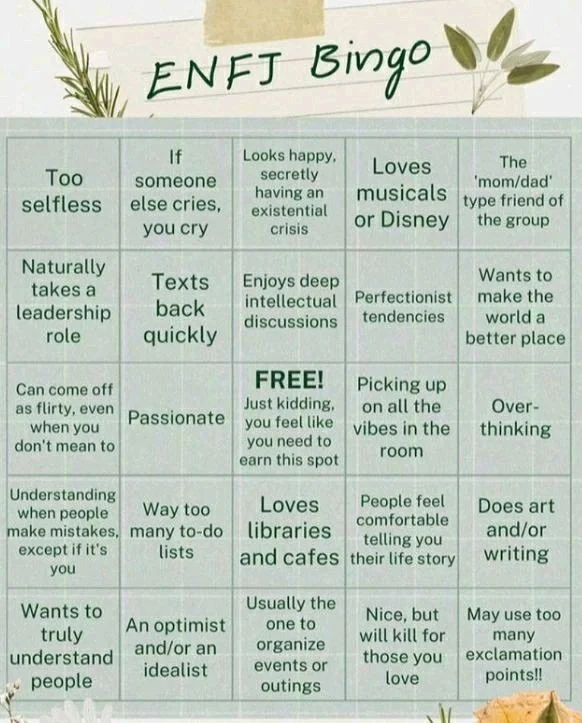We use cookies on our website for a number of purposes, including analytics, performance, and advertising. Learn more.
OK!
Boo
SIGN IN
Toxic Traits of an ENFJ: Unmasking the Dark Side of the "Hero"
By Boo Last Updated: September 11, 2024
Ever wondered why your ENFJ relationship feels more like a Shakespearian tragedy than a Hollywood romance? If you're reading this, there's a good chance you've either recognized some troubling traits in an ENFJ you know or maybe even in yourself. Here, we're getting to the heart of the matter: the traits that transform an ENFJ—often known as the "Hero"—from a guiding light into a toxic presence.
The ENFJ personality type is usually warm, empathetic, and inspiring, but what happens when things go awry? What turns the Hero into a complex character with darker tendencies? Here, we'll dig into the specific traits that can become toxic, why these traits may develop, and practical steps to bring about positive change.
Explore the ENFJ Wellness Series
- Wellness for an ENFJ
- 10 Things that Excite ENFJ
- The Guide to ENFJ Anger
- How ENFJ Handle Stress
- Surprising Sexuality of ENFJ
Understanding the Core Traits of ENFJs
Before diving into what makes an ENFJ toxic, it's important to understand the foundation of their personality. This way, we can better distinguish between what's generally true for most ENFJs and what marks a problematic trait. Below, we delve deeper into some of the key features that make us, ENFJs, who we are.
Empathy and social skills
ENFJs are naturally empathetic individuals. Our dominant cognitive function, extraverted feeling (Fe), makes us attuned to the emotional atmosphere around us. We can easily sense how people are feeling, making us adept at offering emotional support or validation when needed.
Leadership and motivation
One of the standout qualities of an ENFJ is the ability to inspire and motivate others. Our secondary function, introverted intuition (Ni), helps us foresee potential and envision future possibilities. Combined with our Fe, this often places us in roles that require influencing and directing people toward a collective goal.
Proactive and inclusive
Our extraverted nature and focus on societal norms push us to be proactive in our environments. We're the planners, the organizers, and the initiators of social activities. Our skill in making everyone feel included is second to none.
Identifying Detrimental Traits in ENFJs
Even we, ENFJs, have our blind spots. Our cognitive functions—Fe-Ni-Se-Ti—equip us with remarkable social skills and intuitive insights, but they can also become our Achilles heel when misapplied. Recognizing how these cognitive functions can go astray helps us steer clear of potential pitfalls. Let’s examine some specific traits that can tarnish the ENFJ persona.
Manipulative behavior
It's a slippery slope when the ENFJ’s keen insight into human emotions turns manipulative. Leveraging our Extroverted Feeling-Introverted Intuition (Fe-Ni) combo negatively, we might guide people not for their benefit but for our own. An example to consider would be an ENFJ who guilt-trips their partner into attending a family function, despite knowing that their partner is uncomfortable around family gatherings.
Overbearing control
There's a fine line between being a guide and a dictator. Our inclination to help and make decisions for others can manifest as overbearing control. This happens when the Fe function drives us to impose our own values or judgments onto others. It can be as blatant as telling people how to live their lives or as subtle as passive-aggressively steering a group's decision-making.
Ignorance of personal boundaries
Though we're socially adept, we're not always socially appropriate. Our Extroverted Sensing (Se) function can get ahead of us, leading to a disregard for personal boundaries. We might feel that our advice is sage and for everyone's good, but giving unsolicited advice can be a form of boundary violation.
Unpacking the Root Causes of Toxicity
Now that we've outlined some of the toxic traits that can arise, you might be wondering why they emerge in the first place. Let’s dig into some of the root causes and contributing factors for these traits.
Unhealthy coping mechanisms
One reason for the development of toxic traits could be unhealthy coping mechanisms. In stressful or unfamiliar situations, ENFJs might resort to manipulation or control as a way to regain stability.
Covering insecurities
Another contributing factor might be deeply rooted insecurities. The need to control others or manipulate scenarios can be a defense mechanism to shield oneself from perceived threats or feelings of inadequacy.
Strategies for Overcoming Toxic Traits
Identifying the problem is half the battle. The next half involves taking steps to change these toxic traits for the better. Here’s how you can go about it.
Self-awareness
Before making any change, the first thing is to become aware of the traits that need changing. For an ENFJ, this means taking time to reflect on behaviors and identifying which actions or attitudes are proving harmful to oneself or others. Journaling or speaking with a trusted friend can facilitate this process of self-awareness.
Seek outside perspectives
Once you're aware that there is an issue, the next step is to seek validation from external sources. For an ENFJ, this could mean talking to friends, family, or even a mental health professional. Their feedback can offer different perspectives that you might not have considered, enabling you to better understand the extent of the issue.
Make amends
Upon realizing that certain behaviors have harmed others, it’s crucial to make amends. This can take the form of a heartfelt apology or acts of kindness to rectify past wrongdoings. The key here is to show through actions, not just words, that change is underway.
Continuous improvement
Change isn't a one-off event but a continuous process. The last step in altering toxic traits involves a long-term commitment to self-improvement. This could include taking up courses on emotional intelligence, undergoing therapy, or engaging in mindfulness practices to cultivate a better understanding of oneself and others.
FAQs
What makes an ENFJ toxic?
The toxic traits in an ENFJ often stem from their cognitive functions being used in unhealthy ways. This can manifest as manipulative behaviors, overbearing control, and disregard for personal boundaries.
Can a toxic ENFJ change?
Absolutely. Change begins with self-awareness, followed by active efforts to amend negative behaviors and attitudes. Professional help can also be beneficial.
How do I deal with a toxic ENFJ?
Setting clear boundaries is crucial when dealing with a toxic ENFJ. Open communication about your concerns can also help. If necessary, consider reducing contact or seeking mediation.
Do all ENFJs have toxic traits?
No, toxic traits can be found in any personality type. It's how these traits are managed that determines the health of the relationship.
Is toxicity permanent?
Toxicity is not a permanent state; it can be addressed and changed with concerted effort and perhaps professional guidance.
Bringing It All Together
We've taken a deep dive into the shadowy corners of the ENFJ personality type and their toxic traits. Recognizing these traits within ourselves or others is the first step in nurturing healthier, more fulfilling relationships. So, let's strive to be heroes in the truest sense—empowering not just ourselves, but also those around us.
MEET NEW PEOPLE
JOIN NOW
30,000,000+ DOWNLOADS
ENFJ People and Characters
#enfj Universe Posts
Universes
Personalities
Personality Database
Meet New People
30,000,000+ DOWNLOADS
JOIN NOW


























































